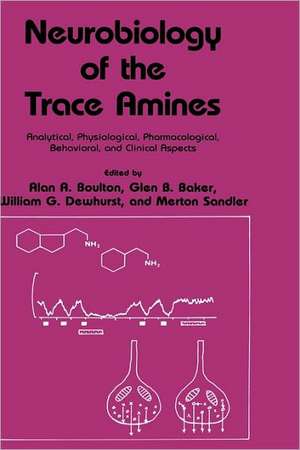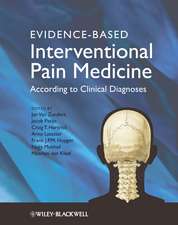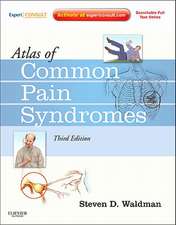Neurobiology of the Trace Amines: Analytical, Physiological, Pharmacological, Behavioral, and Clinical Aspects: Polymer Science and Technology Series, cartea 37
Editat de Alan A. Boulton, Glen B. Baker, William G. Dewhurst, Merton Sandleren Limba Engleză Hardback – 26 apr 1984
| Toate formatele și edițiile | Preț | Express |
|---|---|---|
| Paperback (1) | 1226.70 lei 43-57 zile | |
| Humana Press Inc. – 16 apr 2013 | 1226.70 lei 43-57 zile | |
| Hardback (1) | 1238.42 lei 43-57 zile | |
| Humana Press Inc. – 26 apr 1984 | 1238.42 lei 43-57 zile |
Din seria Polymer Science and Technology Series
-
 Preț: 402.38 lei
Preț: 402.38 lei -
 Preț: 402.98 lei
Preț: 402.98 lei - 18%
 Preț: 1397.34 lei
Preț: 1397.34 lei -
 Preț: 394.51 lei
Preț: 394.51 lei -
 Preț: 407.19 lei
Preț: 407.19 lei -
 Preț: 390.63 lei
Preț: 390.63 lei -
 Preț: 403.91 lei
Preț: 403.91 lei - 15%
 Preț: 666.41 lei
Preț: 666.41 lei - 18%
 Preț: 1240.30 lei
Preț: 1240.30 lei -
 Preț: 387.75 lei
Preț: 387.75 lei -
 Preț: 390.25 lei
Preț: 390.25 lei -
 Preț: 403.15 lei
Preț: 403.15 lei -
 Preț: 393.74 lei
Preț: 393.74 lei -
 Preț: 393.74 lei
Preț: 393.74 lei -
 Preț: 390.63 lei
Preț: 390.63 lei - 18%
 Preț: 1855.26 lei
Preț: 1855.26 lei -
 Preț: 399.67 lei
Preț: 399.67 lei -
 Preț: 400.85 lei
Preț: 400.85 lei -
 Preț: 391.40 lei
Preț: 391.40 lei -
 Preț: 402.56 lei
Preț: 402.56 lei -
 Preț: 404.29 lei
Preț: 404.29 lei -
 Preț: 401.42 lei
Preț: 401.42 lei - 18%
 Preț: 959.04 lei
Preț: 959.04 lei - 18%
 Preț: 959.19 lei
Preț: 959.19 lei - 15%
 Preț: 679.47 lei
Preț: 679.47 lei - 18%
 Preț: 1550.92 lei
Preț: 1550.92 lei -
 Preț: 384.70 lei
Preț: 384.70 lei -
 Preț: 385.62 lei
Preț: 385.62 lei -
 Preț: 411.64 lei
Preț: 411.64 lei - 18%
 Preț: 951.47 lei
Preț: 951.47 lei - 15%
 Preț: 637.59 lei
Preț: 637.59 lei -
 Preț: 403.15 lei
Preț: 403.15 lei - 15%
 Preț: 710.56 lei
Preț: 710.56 lei - 15%
 Preț: 656.89 lei
Preț: 656.89 lei -
 Preț: 384.70 lei
Preț: 384.70 lei -
 Preț: 403.37 lei
Preț: 403.37 lei -
 Preț: 395.85 lei
Preț: 395.85 lei -
 Preț: 388.34 lei
Preț: 388.34 lei -
 Preț: 396.02 lei
Preț: 396.02 lei
Preț: 1238.42 lei
Preț vechi: 1510.27 lei
-18% Nou
Puncte Express: 1858
Preț estimativ în valută:
236.97€ • 248.08$ • 196.08£
236.97€ • 248.08$ • 196.08£
Carte tipărită la comandă
Livrare economică 07-21 aprilie
Preluare comenzi: 021 569.72.76
Specificații
ISBN-13: 9780896030633
ISBN-10: 0896030636
Pagini: 598
Ilustrații: XX, 598 p.
Dimensiuni: 155 x 235 x 33 mm
Greutate: 1.04 kg
Ediția:1984
Editura: Humana Press Inc.
Colecția Humana
Seria Polymer Science and Technology Series
Locul publicării:Totowa, NJ, United States
ISBN-10: 0896030636
Pagini: 598
Ilustrații: XX, 598 p.
Dimensiuni: 155 x 235 x 33 mm
Greutate: 1.04 kg
Ediția:1984
Editura: Humana Press Inc.
Colecția Humana
Seria Polymer Science and Technology Series
Locul publicării:Totowa, NJ, United States
Public țintă
ResearchCuprins
A. Introduction.- Trace Amines: The Early Years.- Trace Amines and the Neurosciences: An Overview.- B. Analysis.- Invited Communications.- Quantification of Trace Amines and Their Metabolites by High Resolution or Metastable Analysis Using Double Focussing Mass Spectrometry.- The Use of Enzymatic Radioisotopic Microassays for the Quantification of ?-Phenylethylamine, Phenylethanolamine, Tyramine, and Octopamine.- Gas Chromatography for Analysis of the Trace Amines in Tissues and Body Fluids.- Free Communications.- Studies on Tryptamine Metabolism by GC-MS and HPLC Techniques.- A Rapid and Specific Technique for the Extraction of Tyramine and Octopamine from Biological Tissues for HPLC Analysis.- Analysis of Octopamine, Dopamine, 5-Hydroxtryptamine, and Tryptophan in the Brain and Nerve Cord of the American Cockroach.- Natural Occurrence and Metabolism of the Isomeric Octopamines and Synephrines.- Octopamine is Present in Retinas of Various Mammalian Species.- C. Physiology and Pharmacology.- Invited Communications.- Investigation of Trace Amine Metabolism in the Central Nervous System through Measurements on Cerebrospinal Fluid.- Analysis of Trace Amines: Endogenous Levels and the Effects of Various Drugs on Tissue Concentrations in the Rat.- Drug-Induced Changes in the Central Metabolism of Tyramine and Other Trace Monoamines: Their Possible Role in Brain Functions.- Aminergic Control of the Electrocorticogram: A Progress Report.- Neuronal Transport of Trace Amines: An Overview.- Electrophysiological Studies of the Possible Role of Trace Amines in Synaptic Function.- Effects of Octopamine and Serotonin on Neurones of Aplysia Californica.- Free Communications.- Individual Housing Stress Elevates Brain and Adrenal Tryptamine Content.- The Uptake and Release of14C-Tryptamine by Rat Brain Slices.- Tryptamine-Induced Changes in Endogenous 5-Hydroxytryptamine and [3H]-5-HT Release from Mouse Hypothalamic Slices.- Effect of Chronic Haloperidol on the Levels of Blood and Urinary Phenylethylamine and Phenylacetic Acid in Rats.- A Comparison of effects of Acute and Chronic Administration of Phenelzine and Tranylcypromine on Brain Concentrations of 2-Phenylethylamine, p-Tyramine, and Tryptamine in the Rat.- Phenylethylamine Deamination in the Noradrenergic Neurotransmitter System.- Effect of Lignocaine on Tyramine and Serotonin Oxidation in Brain.- Degradation Kinetics by MAO of PEA Derivatives. A Model for the Molecular Basis of Their Analgesic and Behavioral effects?.- The Kinetics of Hydroxylation of Phenylethylamine, Amphetamine, and Phenylalanine in Rodent Tissues.- Chronotropic and Inotropic Selectivity of Substituted Phenylethylamines in the Isolated, Perfused Rabbit Heart.- Trace Amine-Peptide Interactions on Central Neurones: I. Tryptamine and Substance P.- Trace Amine-Peptide Interactions: II. Phenylethylamine and enkephalin; p-Tyramine and enkephalin.- D. Behavior.- Invited Communications.- Beta-Phenylethylamine: Some Preliminary Chronic Studies.- ?-Phenylethylamine: A Functional Role at the Behavioral Level?.- Differentiation of Phenylethylamine (PE)- and Amphetamine (AMPH)- Induced Behaviors.- Studies on the Mechanism of Action of ?-Phenylethylamine Stereotypy in Rodents: Implications for a ?-Phenylethylamine Animal Model of Schizophrenia.- Free Communications.- Effects of Tryptamine and 5-Hydroxytryptamine on Food Intake in the Rat.- 5-HT Involvement in Tryptamine-Induced Behavior in Mice.- Hypodipsic Effects of ?-Phenylethylamine, Phenylethanolamine, N-Methylphenylethylamine, and d-Amphetamine: A TemporalAnalysis.- Taste-Dependent Effects of Low Doses of ?-Phenylethylamine and d-Amphetamine on Drinking in the Rat.- ?-Phenylethylamine and d-Amphetamine: Differential Potency in the Conditioned Taste Aversion Paradigm.- Locomotor Stimulant Effect of ?-Phenylethylamine-Naloxone.- E. Clinical Studies.- Invited Communications.- The Origin, Drug Interaction, Urine, Plasma, and CSF Concentrations of Phenylacetic Acid in Normal and Psychiatric Subjects.- The Catabolism of Trace Amines in Some Psychiatric Disorders.- Tyramine and Depressive Illness.- Phenethylamine, Tyramine, and Other Trace Amines in Patients with Affective Disorders: Associations with Clinical State and Antidepressant Drug Treatment.- Phenylethylamine and Schizophrenia—Clinical and Pharmacological Results.- Urinary Excretion of Tryptamine in Comparison to Normetanephrine and beta-Phenylethylamine in Human Volunteers after Subchronic Treatment with Different Monoamine Oxidase Inhibitors.- Free Communications.- p-Hydroxyphenylacetic Acid Concentration in the CSF of Patients with Neurological and Psychiatric Disorders.- Noncatecholic Phenylethylamines and MAO Activity in Diabetes and Migraine.- Phenylethylamine and Tardive Dyskinesia.- Phenylethylamine, Phenylacetic Acid, and Methionine Enkephalin Levels in Humans Following Profound Acute Stress.- 14C-Tryptamine Binding in Parkinson’s Disease and Hepatic Coma.- Biochemical and Antidepressant Mechanisms of L-Deprenyl.












